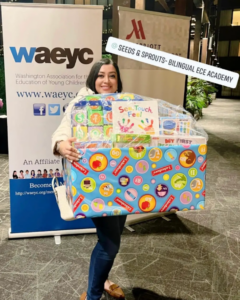At Seeds & Sprouts Bilingual ECE Academy, Iris Ruiz creates an inclusive space where children learn to appreciate diverse cultures. Through a culturally relevant curriculum, language diversity, and open discussions, she fosters a learning environment rich in representation and respect.
Iris emphasizes the need for increased funding, multilingual resources, and mental health support for educators. She believes in the power of networking and continuous learning, encouraging new providers to build genuine connections and embrace professional growth. Her vision for the future includes better recognition for early childhood educators, play-based learning, and improved well-being in the field.
 Meet Iris Ruiz! Iris nurtures a diverse, multilingual learning space where children flourish. Her heart-centered approach builds a strong community and celebrates every culture.
Meet Iris Ruiz! Iris nurtures a diverse, multilingual learning space where children flourish. Her heart-centered approach builds a strong community and celebrates every culture.

Q&A Spotlight:
Q: How do you incorporate cultural responsiveness into your work?
Incorporating cultural responsiveness into our work is vital to creating an inclusive and enriching environment for all children. Our program celebrates a vibrant tapestry of cultures, with families from various parts of Asia, Africa, the Middle East, Europe, and North and South America. It’s truly inspiring to witness children who are not only bilingual but trilingual. Our approach embraces several key areas: Culturally Relevant Curriculum—we strive to reflect the rich diversity of our children by weaving stories, songs, and activities from various cultures into the curriculum. This allows children to see themselves represented and to learn about others. Language Diversity—recognizing the power of language in shaping cultural identity, we incorporate multiple languages into daily activities through bilingual storytelling and basic vocabulary teaching. This connection fosters a sense of pride in their heritage and opens the door to learning about different cultures. Cultural Celebrations—we honor various cultural holidays and events, offering children opportunities to immerse themselves in diverse traditions. This practice nurtures respect and appreciation for our collective diversity. Creating a Safe Environment—we are dedicated to establishing a welcoming space where every child feels valued. Encouraging open discussions about culture and identity allows children to express themselves and gain insight into the experiences of their peers. Through these strategies, we passionately promote an environment that cherishes diversity and uplifts the cultural identities of every child.
Q: What Policies or Support Systems would help you better serve your community?
We need to increase funding for educational programs. More resources for these programs can improve training for teachers, helping them meet the diverse needs of students and families. We should also create community engagement initiatives. Building support networks for families, like counseling services and parenting workshops focused on cultural identity, can strengthen family bonds and help parents understand cultural differences.
Celebrating cultural events is important, too! Many families want to connect with one another, and these events provide a great chance for them to do just that.
Q: What resources have been most helpful to you in your career?
Networking with Peers! Building relationships with fellow educators through local and online communities has been incredibly helpful. Sharing experiences and best practices has enriched my understanding and approach to diverse classrooms.
Q: What additional resources, funding, or policies would make a difference for BIPOC Providers
I would love to see greater access to resources in multiple languages. Ensuring that educational materials, training resources, and support services are available in various languages can significantly help individuals. Additionally, it is important to focus on mental health and well-being by providing accessible mental health resources. These can assist individuals in managing the stress and challenges that come with their roles, especially in environments where they may feel isolated or unsupported.
Q: What advice would you give to other individuals entering this field?
Embarking on a journey in early childhood education (ECE) is a deeply meaningful and fulfilling experience, especially when it aligns with your passion. I realized it was my calling at 15 when the director of an English and computer skills academy gave me the opportunity to teach, which filled my heart with joy! Although I once considered a career as a lawyer, I quickly recognized that nurturing a love for learning was my true path.
I named my business “Seeds & Sprouts,” and it wasn’t until six years later, watching our students grow and flourish like little sprouts, that I truly understood the profound meaning behind the name. Building strong, genuine relationships is at the heart of this journey. Creating heartfelt connections with children, their families, and colleagues lays a solid foundation for a supportive community that enriches the learning experience.
Stay curious and embrace continuous learning; the world of early childhood education is always evolving. Engaging in professional development opportunities helps you stay updated with best practices and insights. Working with young children requires patience and flexibility, as each child is uniquely wonderful. It’s essential to adapt your approach to meet their individual needs with love.
Regularly reflecting on your practice nurtures both personal growth and professional development. By focusing on these key areas, you can build a rewarding and joyful career in early childhood education, making a lasting impact on the lives of the little ones you care for. Never stop learning and growing! Never doubt yourself, and remember to take care of your mental health and well-being. Do everything with love and excellence because kids deserve nothing less!
Q: What changes do you hope to see in the industry for future providers?
I envision a future filled with transformative changes in the early childhood education industry. Firstly, enhancing the recognition and support for the essential role of early childhood educators would be revolutionary, including improved compensation, benefits, and professional development opportunities that attract and retain dedicated professionals. We prioritize this approach at our center because caring for our educators is paramount; we want them to feel valued and appreciated. I also aspire to see a heightened focus on mental health and well-being within the field, fostering self-care practices and nurturing supportive work environments that uplift our educators, ultimately elevating the quality of care and education.
Lastly, integrating more play-based and experiential learning in curricula can inspire creativity and exploration, allowing children to develop critical thinking skills and a lifelong love for learning. These changes could pave the way for a brighter future for both educators and the young minds they nurture.



